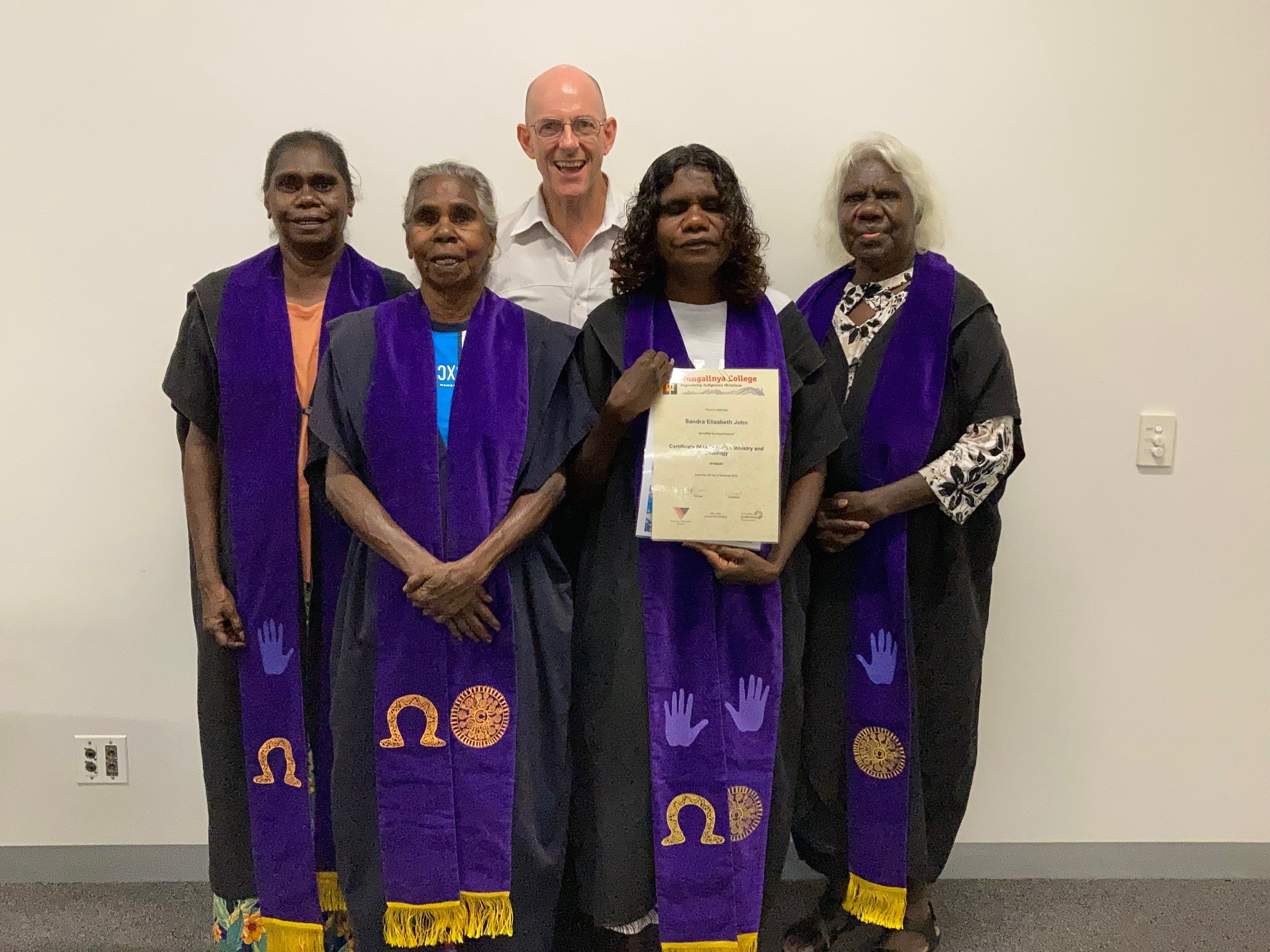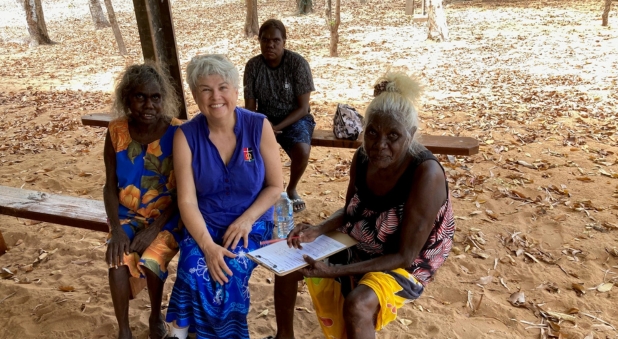For well over a century, the work of the Church Missionary Society Australia has included sharing the love of Jesus with Aboriginal people in the Northern Territory – and recently the Territory’s Anglican bishop, Greg Anderson, and some of his Aboriginal ministry colleagues, spoke at CMS Summer School in Katoomba about how God is working in their midst,
“So many good things are happening among us in the Aboriginal churches of the Territory,” Bishop Anderson said.
“First of all, there’s a new generation of church leaders... in particular, a new cohort of male leaders.
“These four men have been a great support for each other as they prepared for ordination, and now, if they need encouragement, they don’t ring up all the time to the whitefellas, the munanga, the balanda, but they call each other. And that has been a really special thing.”

On the platform with Bishop Anderson were two of these men: the Rev Darryn Farrell, who ministers to his community at Minyerri, three hours southeast of Katherine; and the Rev James Woods who, along with his wife Miriam Numamurdirdi, serves the community at Urapunga (just west of Ngukurr) and at Nungalinya College, the Indigenous Bible college in Darwin.
Their local communities are small and Mr Woods said that, at Urapunga, “People can hear from their homes that we’re having a big fellowship and people are singing with joy”.
Some community members gave their lives to Jesus in the past year, which was a cause for great rejoicing – not only because they had learned the truths of the gospel and joined the church, but because family members who aren’t believers now come to church with them.
“Even if they’re not Christian they still come, to support and to encourage this new Christian,” Mr Woods explained. “And while this person is there, the people of the whole community will come and their family will be joined into that.”
Mr Farrell would love to see more of his community stand up for Jesus and be part of the church, as well as undergoing Bible college training, but said it can be hard for people to go out from the community.
He is also keen to show Minyerri locals how God has spoken to Aboriginal people through dreamtime stories. He paints, and takes kids on walkabout to teach them – and remind himself – how God wants to shape people into Christ’s likeness.
“Our billabong has stories from many years back,” he said, as he recalled standing beside it with his grandmother, aunty and uncle. “It’s a normal billabong... but there’s a rock inside of it and, when we were kids, we would swim in the billabong and stand on that rock. It’s still there today, and that rock is the one that keeps the water alive and fresh... without that rock there’d be no billabong.
“I teach that to the kids – that Jesus Christ is also that rock, and what comes from him is the living word.”
Walk together
Bishop Anderson also spoke about a forum created to make it easier for Aboriginal leaders to express to the diocese their people’s challenges and hopes.
“Aboriginal church leaders come to all the normal things our clergy come to; ordained and lay people come to our synods – that’s all good,” he said. “But these forums are dominated by English and munanga whitefella faces... and Darren and James and Miriam can be confident in that environment, but at the same time it’s a bit swamping.”
Taking the first letter of “word” or “story” in the four main languages used in the diocese, the forum has been named WALK; Bishop Anderson sees it as “a great picture of white- fellas and the Aboriginal church leaders walking together”.
To underscore the ongoing importance of Bible translation, he added that while there was a complete Bible in Kriol, there is only a New Testament in Wubuy and Kunwinjku, and seven books in Anindilyakwa. “[Translation] is really the powerhouse of the church, because as people hear God’s word and are trained in it and respond to it, they hear God speaking – and we want them to hear God speaking in their own language.”
Partnerships with churches were highlighted, such as the ongoing link between Minyerri and the Anglican congregation from Bobbin Head, which the bishop would be more than happy to replicate elsewhere.
“We are very open to those kinds of partnerships,” he said. “Over the years, [Bobbin Head members] have grown so many relationships with the church people there. They just come and hang out, and the Minyerri people really appreciate that... but it’s also a real encouragement to Minyerri people to know that people outside their own little patch are interested in them and praying for them and supporting them.”
Training
A range of subjects have begun in recent years at Nungalinya College, including courses in chaplaincy – which Miriam Numamurdirdi has studied and now teaches to others – children’s ministry, translation, faith and family, and leadership.
Ms Numamurdirdi now volunteers at Darwin Hospital as a chaplain, alongside Kriol-speaking missionaries. She said people need God’s word in hospital, especially if they didn’t know Jesus and were separated from family.
She particularly mentioned one man they had prayed for, who had been in hospital a long time. On a return visit less than a week later, they found him up, with family around him, ready to be discharged.
“God is so powerful if we have faith and believe in him,” she said simply. “[There are] so many ways we can help.”
Part of Nungalinya’s training is on country, which not only makes it more accessible for students but allows teachers to present a course in a local Aboriginal language.
“There are so many different languages in the classroom – maybe 10 or 15 different languages among 20 or 25 people – so English is the language of the classroom but, if you go on country, it just gives an opportunity to do that in one community,” the bishop said.
“[My wife] Annette and I went out to Gunbalanya, and Annette was teaching an Old Testament overview course; and there were some cards and actions that tracked through the story.
“She was able to help the students to think up how we would express those important truths in Kunwinjku so that they’ve got it anchored in their own mind, not in foreign concepts but in their own heart language.”


















